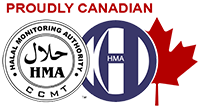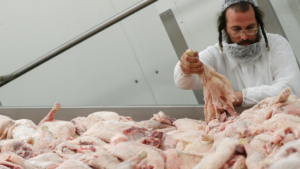Since the beginning of 2020, the entire world has been in a rather extended crisis due to the COVID-19 epidemic. The virus, which originated in China, has resulted in significant economic devastation. Inflation experienced by Canada in March 2020 was recorded at 0.10% (Month on Month) and 2.96% (Year on Year). This condition affected the US dollar and the problem of properly meeting the availability of food, raw materials, and other supporting commodities. Islam comprehensively regulates every aspect of human life. It governs everything that humans must do or what they have to abandon. All orders and prohibitions that the Sharia has established aim to achieve goodness. Every country has established a system to meet the halal requirements to achieve excellence. Due to this, HMA CANADA devises a three-step inspection plan. That monitors the complete process. The whole process is in direct observation of our experts.
Halal cuisine has grown from a religious dietary option to an assurance of safe, nutritious, sanitary, and trustworthy food due to the strict criteria in obtaining halal certification. As food security concerns drive demand for healthier choices, the development of the ethical consumer has drawn non-Muslim customers to halal brands and goods. Various research findings reveal that non-Muslims have a favorable opinion of halal food items and have strong inclinations to purchase them since they know halal food is properly prepared. So If you want to get halal food and halal meat in Toronto, visit the HMA website to check the list of halal meat and food supplies in Toronto.
The completeness of Islamic law is proven by carrying out all worship during the COVID-19 pandemic, even though with several reliefs found by Allah and the economic field. In this study, financial rules following sharia principles are called the halal economy. The COVID-19 epidemic put unforeseen strains on food systems, posing several urgent challenges. COVID-19 has inflicted shocks on all sectors of the food supply chain, affecting agricultural output, food processing, transportation and logistics, and final demand all at the same time. Not all industries and goods have been equally impacted, and different items have faced interruptions at various points throughout the supply chain. However, we believe that the worst is behind us and that the halal food business will grow by leaps and bounds in the next few years.
The rapid response of food supply chains has underscored the importance of an open and predictable international trading environment, allowing firms to tap into new sources of supply when existing sources are compromised. Some barriers exist, and additional disruptions may occur as COVID-19 spreads. However, what is noteworthy is the rapidity with which supply chain actors have been able to restructure themselves to assure continuing food availability, at least in the industrialized world.
When individuals ask, “How can my firm engage the Halal consumers during this critical time?” The answer is nearly always, “it depends.” The Halal market is diverse. They reside in various geographical areas, and their demographics, purchasing habits, requirements, wants, and hobbies differ. Halal customers are not usually those who adhere to Islamic dietary guidelines. People of many faiths might buy things because they feel they are qualitatively superior to mainstream offers. This group represents a rising minority in the United States.
Companies may get a competitive edge by expanding into the gulf area, where there is a considerable demand for Halal-compliant products. Other potential includes the digitalization of the halal business, emphasizing e-commerce demand as more customers purchase online post-Covid-19.
For various reasons, such as detecting haram substances such as rennet in cheese manufacture, technology has always been critical in the halal business. Thanks to technological improvements, companies may now use fungal rennet to replace halal-certified products. With customers socially distancing themselves due to Covid-19, online grocery shopping has expanded, emphasizing the significance of rising demand for halal items online.
The auditing procedure for food safety and halal compliance is another step within halal certification that has been influenced by social distance. There has been an upsurge in remote auditing to overcome the difficulty of not being able to visit locations. It’s also evident that AI and automation promise the sector, potentially cutting total operating expenses for businesses and delivering customers superior quality at a lower price. This webinar will go deeper into the halal industry’s digitalization and the effects of halal claims on customer behavior.
The Halal customer is diversified and one-of-a-kind. It might feel like seeking a needle in a haystack to find them. Tech-savvy company firms may use tools with Halal-certified items to reach this particular market. The time of covid provides you with an opportunity to become the best by digitizing your halal items. If you are having trouble selling your goods online, please get in touch with us, and our professionals will assist you to the best of their abilities.




